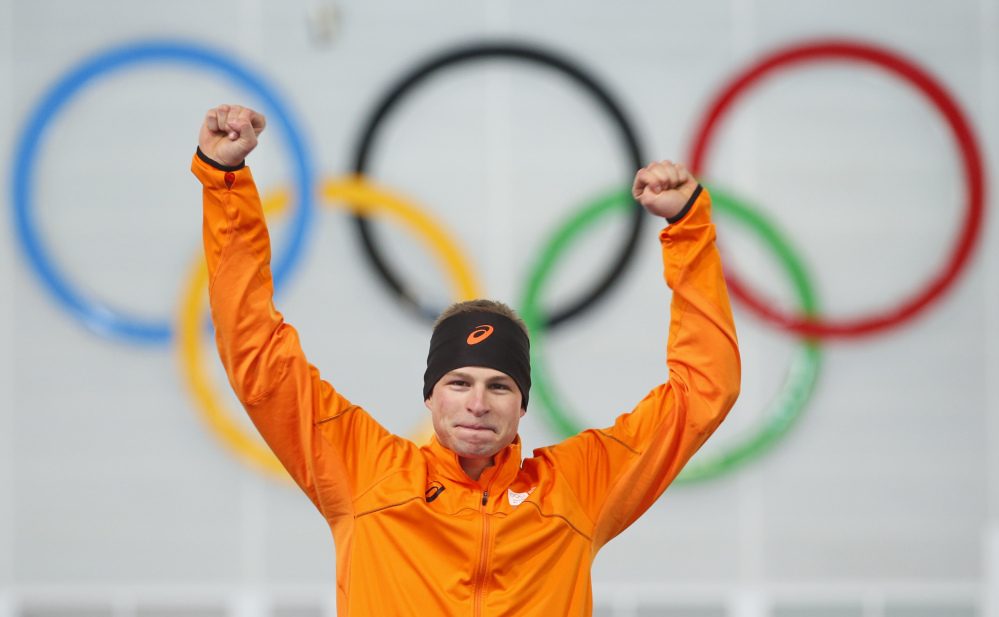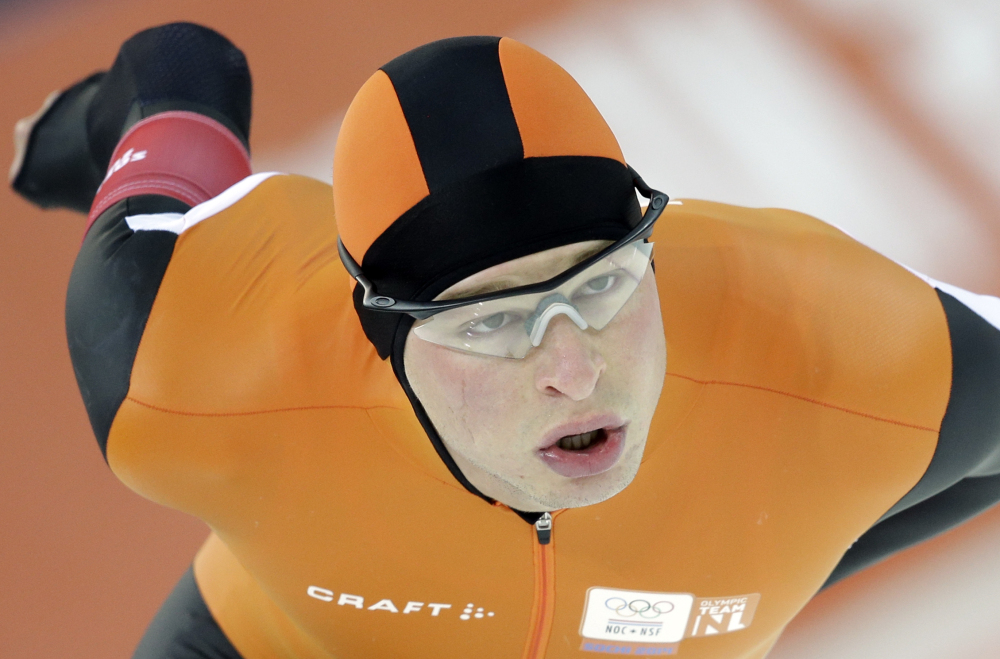SOCHI, Russia — Sven Kramer got started on his road to Olympic redemption with a rousing performance that drew a royal rave review.
The 27-year-old Dutchman blew away the field and defended his title in the men’s 5,000 meters Saturday, winning gold with an Olympic-record time of 6 minutes, 10.76 seconds.
The powerful Dutch team swept the medals. Jan Blokhuijsen took the silver and Jorrit Bergsma claimed the bronze.
All three were cheered on by the king of the Netherlands, Willem-Alexander, his wife Queen Maxima, and Dutch Prime Minister Mark Rutte.
“What can you say? We could never have hoped for such a great result,” the king, himself a keen speedskater, said. “That Sven was able to deliver despite such pressure, it leaves me speechless. What can you say, such a great Olympic record.”
Chad Hedrick, the American who won the 5,000 in Turin eight years ago, tweeted his congratulations to Kramer.
“A legend in the making!” Hedrick wrote.
Kramer flew around the Adler Arena with amazingly consistent laps, all falling within a range of eight-tenths of a second. He easily beat the Olympic mark of 6:14.60 he set while winning gold at Vancouver four years ago. His fastest lap was 29.04 seconds. His slowest was his last, 29.84.
“I knew it was a good race,” Kramer told NOS, the Dutch national broadcaster. “I’ve had 6:10 in my head all week and I’ve had sleepless nights thinking 9.2, 9.2, 9.2. Skate only 29.2 laps and keep going as long as possible and it worked.”
Kramer is determined to sweep the two longest speedskating races in Sochi and make up for a series of Olympic flops that have marred his otherwise brilliant career – most notably at the Vancouver Games, where he made an inexplicable error in the 10,000. Directed into the wrong lane by his coach, he was disqualified in a race he should have won easily.
There’s more. As a teenager during the 2006 Winter Games, Kramer clipped a lane marker during team pursuit and took out his heavily favored squad. There were more problems in the pursuit four years ago, when some poor teamwork cost the Dutch another shot at gold.
Only three gold medals will do in Sochi.
One down, two to go.
“The pressure is gigantic, the pressure is immense,” Kramer conceded.
Blokhuijsen earned the silver in 6:15.71. Bergsma set a quicker pace than Kramer in the early going, but he couldn’t maintain the speed. He settled for bronze in 6:16.66.
The Dutch earned their 28th speedskating gold and moved within one of equaling the U.S. team, which has won more golds in the sport than any other country.
Seventeen-year-old Emery Lehman of Oak Park, Ill., was the top American finisher, placing 16th in his Olympic debut. Jonathan Kuck of Champaign, Ill., was 19th, one spot ahead of Patrick Meek of Chicago.
Russia’s Denis Yuskov thrilled the home crowd by briefly claiming the lead before the dominant Dutch dropped him to sixth.
Kramer’s world championship record is unsurpassed, with six all-round titles and 13 distance titles. But his legacy as one of the best ever will only be complete if he can make up for his Olympic disappointments.
If he was burdened by the pressure, he certainly didn’t show it. Kramer stepped on the ice while a Russian band – complete with four pompom-waving cheerleaders – entertained the crowd during the second resurfacing break. The Dutch-dominated crowd roared when they spotted their favorite glide around the turn. He returned their adulation with a big smile and wave.
Turning on his game face, Kramer pumped his fist confidently toward the Dutch coaching contingent when he came around the oval again.
The draw was a bit of a disadvantage for Kramer, who skated in the 10th of 13 pairings. His closest challengers all went after him, which meant they would know how fast they needed to go for gold.
But Kramer put up a time no one came close to touching.
Send questions/comments to the editors.




Comments are no longer available on this story